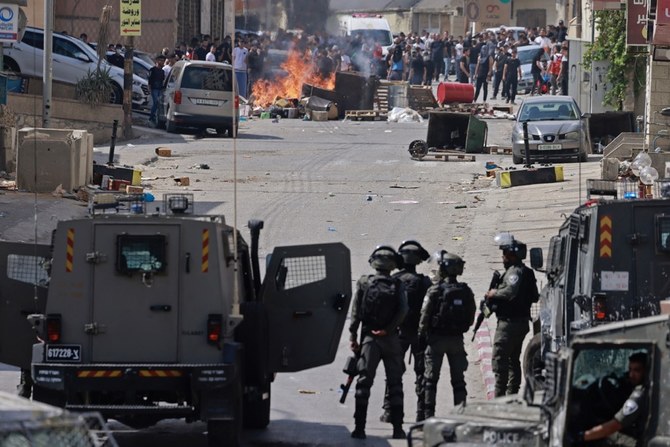
It is increasingly the wild, wild West Bank, as lawless armed Israeli settler groups seize land while attacking Palestinian civilians, smashing property, ravaging crops and assaulting those they wish to push out of their homes.
There is no sheriff, no “Magnificent Seven” to hold off these cowboys. The Israeli army just stands by. The latest assault involved up to 100 settlers in the South Hebron hills and led to a three-year-old Palestinian boy being hospitalized with a head injury. Few leaders dare label it terrorism or condemn the violent settlers as terrorists. Why not?
The settlers are no longer a motley crew inhabiting caravans on hilltops, but a huge population with an economy attracting billions in external investment, including from major European financial institutions.
That the settlers act with carefree impunity is not new. They have done so ever since the occupation began in 1967. The Israeli army’s mission is solely to protect the settlers, not the Palestinians. The international community barely comments.
But what is changing is the sheer scale of the settlement enterprise and the soaring confidence of these contingents of gung-ho wannabe ethnic cleansers. For sure, most settlers are not like this, but enough are, making life impossible for the Palestinian residents, while the Israeli state connives with the newcomers.
To indicate the scale, the number of Israeli settler attacks on Palestinians doubled in the first six months of 2021 compared to the same period last year. Overall incidents of violence have risen from 363 in 2019 to 507 in 2020 and 416 in the first six months of this year alone.
The Israeli settlement project is typically measured in the media in terms of population (now 622,670) or the number of settlers and settlement units being built. The expansion has been extraordinary, with settlements now controlling up to 42 percent of the West Bank.
Yet what is often neglected is the burgeoning scale of the settler economy. There are more than 1,000 factories in the settlements, built on Palestinian land and using their valuable resources, especially water and rock. In the Jordan Valley, the settler population is relatively small, but there are huge settlement plantations, where human rights group report the use of Palestinian child labor.
So how large is this settler economy and, in particular, how much is the outside world investing in it? The UN Human Rights Council published a database in 2020 of 112 business enterprises involved in the Israeli settlements. There are many more.
We are not talking millions but billions of dollars of European investment going into the settler economy.
Chris Doyle
The Don’t Buy Into Occupation coalition — formed from 25 Palestinian, regional and European organizations based in Belgium, France, Ireland, the Netherlands, Norway, Spain and the UK — has produced a detailed report into these investments.
The top-line figures are extraordinary. We are not talking millions but billions of dollars of European investment going into the settler economy. Between 2018 and May 2021, a whopping “672 European financial institutions, including banks, asset managers, insurance companies, and pension funds, had financial relationships with 50 businesses that are actively involved with Israeli settlements.” the report said.
In the same period, according to the study, “$114 billion was provided in the form of loans and underwritings. As of May 2021, European investors also held $141 billion in shares and bonds of these companies.”
The top 10 creditors include major names, such as BNP Paribas, Deutsche Bank, HSBC and Barclays. BNP Paribas lent $8.97 billion or 14 percent of the total value of loans to enterprises involved in Israel’s settlement project, the report said.
These are the figures that can be substantiated. Who knows what the ultimate amount might be, especially if investments from the US are included? Settler businesses often disguise the origins of their products in order to gain preferential access to the EU market.
Let us remember that Israeli settlements are a flagrant violation of the Fourth Geneva Convention of 1949 against civilian settlements established by an occupying power in occupied territory. Settlements entail the theft of land and resources, and are at the heart of the Israeli process of de facto annexation of occupied territory.
The settlements are also a war crime under the 1998 Rome Statute of the International Criminal Court, and violate numerous UN Security Council resolutions. Few nations reject that view, and the corporate world by and large ignores this, with a few notable exceptions.
Influential pension funds, such as the Norwegian KLP, have withdrawn their investments from companies including Motorola. Others must follow or be made to follow. The most recent of these was Ben & Jerry’s, the ice cream maker that decided to stop selling its products in the settlements. The subsequent vitriol from anti-Arab racists was off the charts.
In the past, some companies developed short-term bouts of courage but wilted under pressure. In 2018, Airbnb announced it would cease advertising its properties in the settlements, only to buckle lamely under harsh lobbying. Its rival Booking.com still operates in the settlements. This is all part of the vast Israeli tourism industry, with package tours that typically include occupied territory.
In the construction sector, Heidelberg Cement, the major German building materials company, also operates quarries in the settlements. Other companies have supplied equipment used in the demolition of Palestinian homes, all too often to make way for settlements.
The nexus between business and human rights is a vital one, where progress has been limited. It is the area where consumers start to exercise direct influence. Businesses worry about their global brand and reputation. Links with slave labor or animal cruelty, for example, are risky.
Many of these businesses are signed up to a variety of international instruments, including the UN Global Compact, UN guiding principles on business and human rights, and the OECD guidelines for multinational enterprises, yet seem to have just airbrushed their obligations in occupied territories. These include avoiding any complicity, and direct or indirect involvement, through supply chains.
In the case of the settler economy, companies are obliged to disengage completely. European governments are shareholders in some of these financial institutions, so have the opportunity to press for change.
Corporate involvement in the wild West Bank settler economy should have been stopped long ago. Investments should be met with the same opprobrium as trade in ivory, blood diamonds or illegal drugs. Why should corporate greed triumph over the human rights of a people under occupation? Then again, governments and bodies such as the EU should be enforcing a ban on trade with settlements.
All these billions could be diverted to a ready-made alternative that, unshackled from occupation, would be worthy of large-scale investment — the Palestinian economy.
• Chris Doyle is director of the London-based Council for Arab-British Understanding (CAABU). Twitter: @Doylech
Disclaimer: Views expressed by writers in this section are their own and do not necessarily reflect Arab News" point-of-view












